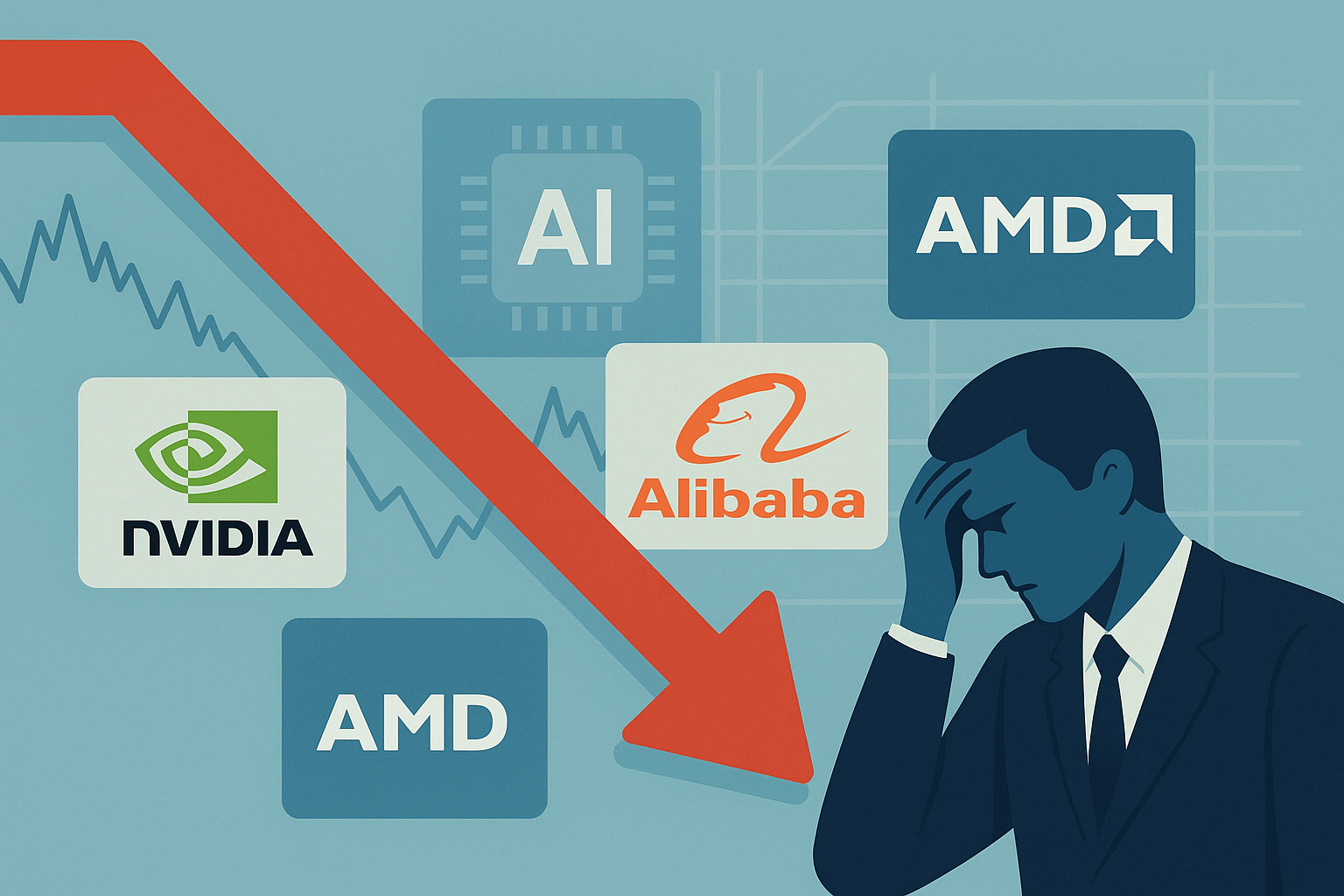Global equity markets entered September on a cautious note as U.S. stock futures edged lower late Monday, driven by weakness in artificial intelligence (AI) shares. Nvidia, AMD, and TSMC—widely considered the backbone of AI infrastructure—each slipped following reports that Chinese e-commerce giant Alibaba is accelerating plans to launch its own AI chip, a potential rival to Nvidia’s H20 accelerator.
This development comes at a time when investors are already jittery over tariff uncertainties, bond market volatility, and rising geopolitical risks. The news underscores the intensifying race in AI hardware—a space that has been one of the most lucrative drivers of equity market gains over the past two years.
Why This Matters for Investors
Nvidia has become nearly synonymous with AI hardware, capturing roughly 80% of the market for advanced GPUs used in AI training and inference, according to industry estimates cited by Bloomberg. Its valuation, which briefly topped $3 trillion earlier this year, has been heavily tied to its dominance in this sector.
However, Alibaba’s entry signals that the AI hardware market could become more fragmented. With China eager to reduce dependence on U.S. semiconductor technology, Beijing has been encouraging national champions like Alibaba, Huawei, and SMIC to accelerate self-sufficiency in chips. Reports indicate Alibaba’s chip is being designed to rival Nvidia’s H20—a model that has been widely adopted by leading data centers and AI firms across Asia.
For investors, this raises two critical questions:
- How much of Nvidia’s market share could be at risk if Alibaba successfully develops and deploys its chip domestically?
- Will global demand for AI hardware remain strong enough to sustain the valuations of U.S. semiconductor leaders even in the face of new entrants?
The Market Impact
Following the reports, Nvidia shares dropped over 3% in after-hours trading, while AMD and TSMC also saw declines. The Nasdaq futures dipped, dragging broader U.S. stock futures lower.
According to Investor’s Business Daily, this is part of a broader trend where AI-related stocks—once the unshakable market leaders—have begun to show signs of volatility amid rising competition and regulatory scrutiny. Analysts at Goldman Sachs recently noted that AI hardware spending is expected to exceed $200 billion annually by 2027, but margins could compress if competition intensifies.
Alibaba, for its part, is no stranger to chip design. Its semiconductor unit, T-Head, has already rolled out chips for cloud computing and IoT. But developing a GPU capable of matching Nvidia’s AI accelerators is a far more complex challenge. Whether Alibaba can achieve technological parity remains uncertain, but even the prospect of heightened competition is enough to spark market reactions.
Future Trends to Watch
- Global AI Hardware Competition: Beyond Alibaba, Huawei and other Chinese firms are racing to build AI chips. Meanwhile, U.S. companies like Intel and startups such as Cerebras and Graphcore are also vying for market share.
- Trade and Tariff Policies: The Biden administration has tightened export restrictions on high-end chips to China. If Alibaba succeeds in producing competitive domestic chips, it could reshape the effectiveness of these restrictions.
- Valuation Pressure on AI Leaders: Nvidia’s price-to-earnings ratio remains elevated compared to historical averages. Any sign of slowing demand or margin compression could trigger broader market pullbacks.
- Energy and Infrastructure Strains: The rise of AI and crypto mining simultaneously is creating enormous pressure on global energy supplies, a theme increasingly highlighted by analysts at McKinsey and the International Energy Agency.
Key Investment Insight
Investors should reassess concentrated bets on Nvidia and other AI hardware giants. While long-term demand for AI infrastructure remains robust, rising competition could cap margins and reduce growth expectations. Hedging strategies—such as diversifying into software beneficiaries of AI, or into second-tier chipmakers with niche advantages—may help manage risk.
For those with exposure to Chinese tech, Alibaba’s chip ambitions could strengthen its long-term positioning in cloud and AI services, though near-term regulatory risks remain high. ETFs with diversified AI exposure may provide a more balanced entry point than single-stock bets.
AI remains one of the defining investment themes of this decade. But as competition heats up and valuations stretch, investors must balance optimism with caution.
Stay tuned with MoneyNews.Today for daily, data-driven insights on how global trends in AI, technology, and markets are shaping tomorrow’s investment opportunities.





